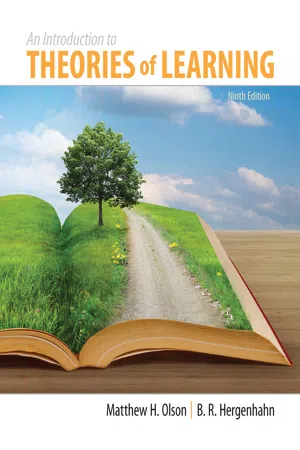
- 480 pages
- English
- ePUB (mobile friendly)
- Available on iOS & Android
About this book
Defines learning and shows how the learning process is studied. Clearly written and user-friendly, Introduction to the Theories of Learning places learning in its historical perspective and provides appreciation for the figures and theories that have shaped 100 years of learning theory research. The 9th edition has been updated with the most current research in the field. With Pearson's MySearchLab with interactive eText and Experiment's Tool, this program is more user-friendly than ever. Learning Goals Upon completing this book, readers should be able to: Define learning and show how the learning process is studied Place learning theory in historical perspective Present essential features of the major theories of learning with implications for educational practice Note: MySearchLab does not come automatically packaged with this text. To purchase MySearchLab, please visit: www.mysearchlab.com or you can purchase a ValuePack of the text + MySearchLab (at no additional cost).
Frequently asked questions
- Essential is ideal for learners and professionals who enjoy exploring a wide range of subjects. Access the Essential Library with 800,000+ trusted titles and best-sellers across business, personal growth, and the humanities. Includes unlimited reading time and Standard Read Aloud voice.
- Complete: Perfect for advanced learners and researchers needing full, unrestricted access. Unlock 1.4M+ books across hundreds of subjects, including academic and specialized titles. The Complete Plan also includes advanced features like Premium Read Aloud and Research Assistant.
Please note we cannot support devices running on iOS 13 and Android 7 or earlier. Learn more about using the app.
Information
Table of contents
- Cover Page
- Series
- Title Page
- Copyright Page
- Contents
- PREFACE
- PART ONE Introduction to Learning
- PART TWO Predominantly Functionalistic Theories
- PART THREE Predominantly Associationistic Theories
- PART FOUR Predominantly Cognitive Theories
- PART FIVE A Predominantly Neurophysiological Theory
- PART SIX An Evolutionary Theory
- PART SEVEN Part VII
- GLOSSARY
- REFERENCES
- NAME INDEX
- SUBJECT INDEX